Building Professional Capacity: Nursing Leadership Roles Report
VerifiedAdded on 2023/01/06
|6
|1554
|73
Report
AI Summary
This report delves into the critical leadership roles of graduate registered nurses, specifically focusing on delegation of care and patient advocacy. It explains why these roles are essential for graduate nurses, emphasizing their impact on patient safety and effective healthcare delivery. The report highlights how delegation allows nurses to prioritize critical thinking and high-value tasks, while advocacy ensures patient needs are addressed and workplace environments are improved. Furthermore, the report examines the patient care outcomes resulting from effective and ineffective delegation, including patient satisfaction and safety. It underscores the importance of these leadership skills in ensuring quality care, reducing errors, and promoting positive patient experiences, concluding that delegation and advocacy are vital competencies for graduate registered nurses to fulfill their responsibilities and contribute to positive patient outcomes.

Leading and Learning: Building
Professional Capacity
1
Professional Capacity
1
Paraphrase This Document
Need a fresh take? Get an instant paraphrase of this document with our AI Paraphraser
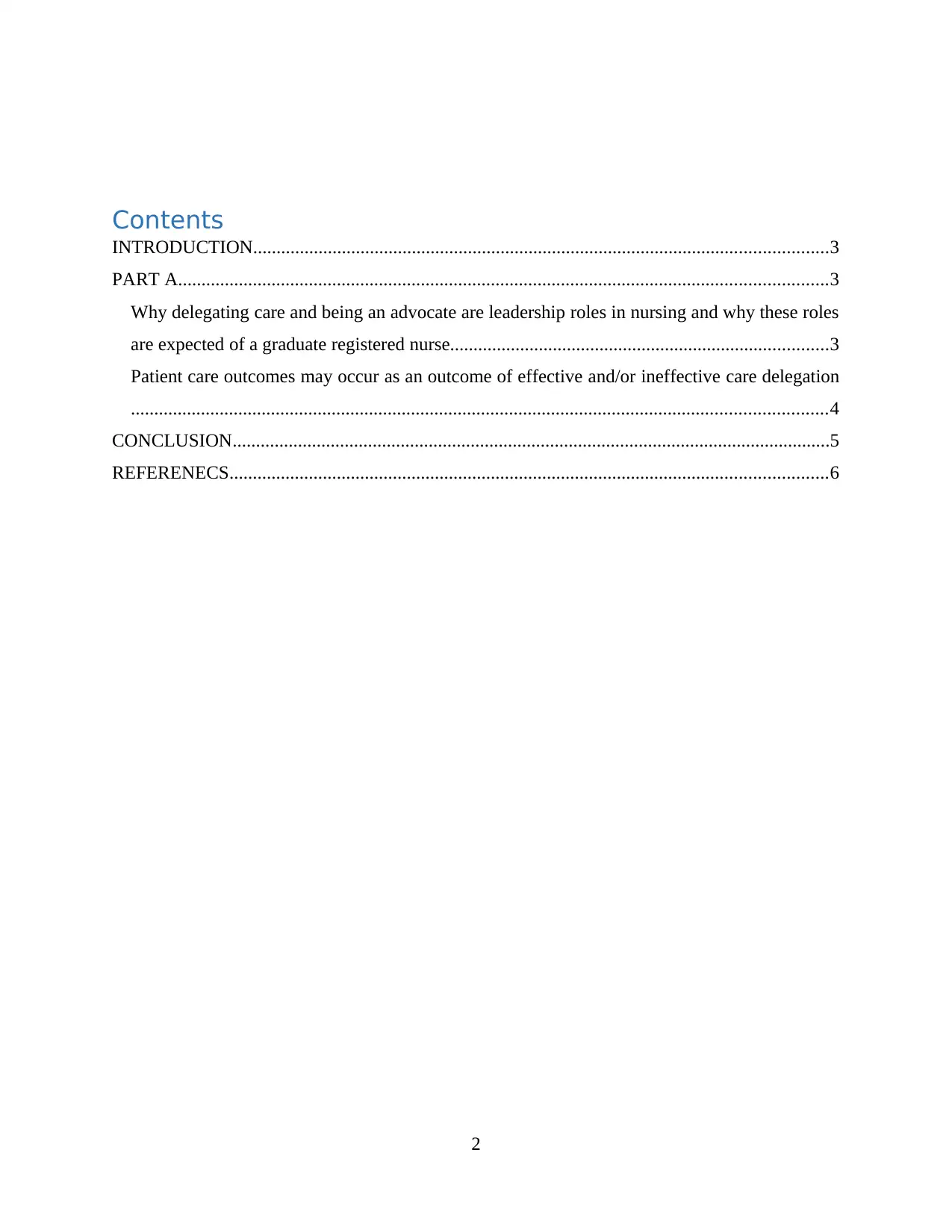
Contents
INTRODUCTION...........................................................................................................................3
PART A...........................................................................................................................................3
Why delegating care and being an advocate are leadership roles in nursing and why these roles
are expected of a graduate registered nurse.................................................................................3
Patient care outcomes may occur as an outcome of effective and/or ineffective care delegation
.....................................................................................................................................................4
CONCLUSION................................................................................................................................5
REFERENECS................................................................................................................................6
2
INTRODUCTION...........................................................................................................................3
PART A...........................................................................................................................................3
Why delegating care and being an advocate are leadership roles in nursing and why these roles
are expected of a graduate registered nurse.................................................................................3
Patient care outcomes may occur as an outcome of effective and/or ineffective care delegation
.....................................................................................................................................................4
CONCLUSION................................................................................................................................5
REFERENECS................................................................................................................................6
2
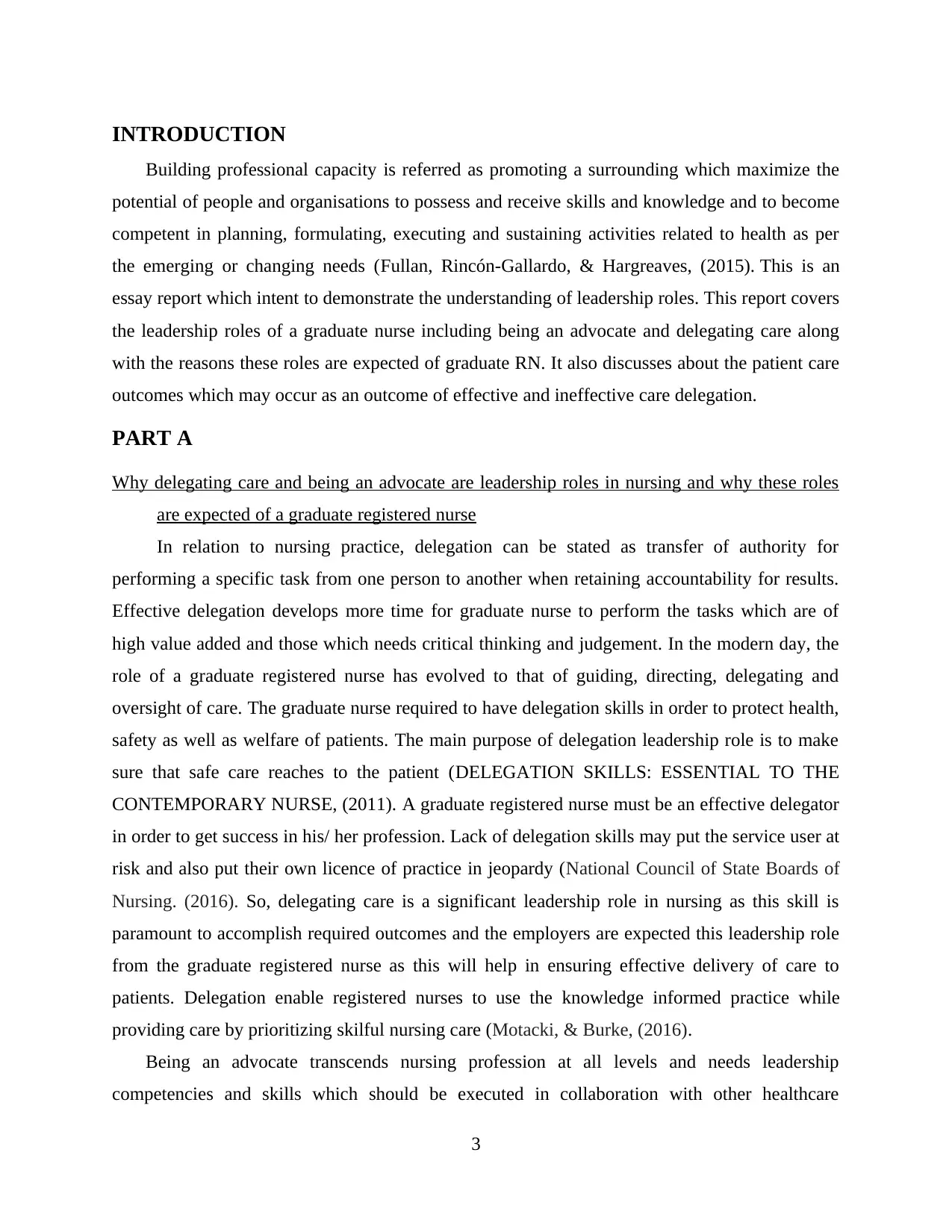
INTRODUCTION
Building professional capacity is referred as promoting a surrounding which maximize the
potential of people and organisations to possess and receive skills and knowledge and to become
competent in planning, formulating, executing and sustaining activities related to health as per
the emerging or changing needs (Fullan, Rincón-Gallardo, & Hargreaves, (2015). This is an
essay report which intent to demonstrate the understanding of leadership roles. This report covers
the leadership roles of a graduate nurse including being an advocate and delegating care along
with the reasons these roles are expected of graduate RN. It also discusses about the patient care
outcomes which may occur as an outcome of effective and ineffective care delegation.
PART A
Why delegating care and being an advocate are leadership roles in nursing and why these roles
are expected of a graduate registered nurse
In relation to nursing practice, delegation can be stated as transfer of authority for
performing a specific task from one person to another when retaining accountability for results.
Effective delegation develops more time for graduate nurse to perform the tasks which are of
high value added and those which needs critical thinking and judgement. In the modern day, the
role of a graduate registered nurse has evolved to that of guiding, directing, delegating and
oversight of care. The graduate nurse required to have delegation skills in order to protect health,
safety as well as welfare of patients. The main purpose of delegation leadership role is to make
sure that safe care reaches to the patient (DELEGATION SKILLS: ESSENTIAL TO THE
CONTEMPORARY NURSE, (2011). A graduate registered nurse must be an effective delegator
in order to get success in his/ her profession. Lack of delegation skills may put the service user at
risk and also put their own licence of practice in jeopardy (National Council of State Boards of
Nursing. (2016). So, delegating care is a significant leadership role in nursing as this skill is
paramount to accomplish required outcomes and the employers are expected this leadership role
from the graduate registered nurse as this will help in ensuring effective delivery of care to
patients. Delegation enable registered nurses to use the knowledge informed practice while
providing care by prioritizing skilful nursing care (Motacki, & Burke, (2016).
Being an advocate transcends nursing profession at all levels and needs leadership
competencies and skills which should be executed in collaboration with other healthcare
3
Building professional capacity is referred as promoting a surrounding which maximize the
potential of people and organisations to possess and receive skills and knowledge and to become
competent in planning, formulating, executing and sustaining activities related to health as per
the emerging or changing needs (Fullan, Rincón-Gallardo, & Hargreaves, (2015). This is an
essay report which intent to demonstrate the understanding of leadership roles. This report covers
the leadership roles of a graduate nurse including being an advocate and delegating care along
with the reasons these roles are expected of graduate RN. It also discusses about the patient care
outcomes which may occur as an outcome of effective and ineffective care delegation.
PART A
Why delegating care and being an advocate are leadership roles in nursing and why these roles
are expected of a graduate registered nurse
In relation to nursing practice, delegation can be stated as transfer of authority for
performing a specific task from one person to another when retaining accountability for results.
Effective delegation develops more time for graduate nurse to perform the tasks which are of
high value added and those which needs critical thinking and judgement. In the modern day, the
role of a graduate registered nurse has evolved to that of guiding, directing, delegating and
oversight of care. The graduate nurse required to have delegation skills in order to protect health,
safety as well as welfare of patients. The main purpose of delegation leadership role is to make
sure that safe care reaches to the patient (DELEGATION SKILLS: ESSENTIAL TO THE
CONTEMPORARY NURSE, (2011). A graduate registered nurse must be an effective delegator
in order to get success in his/ her profession. Lack of delegation skills may put the service user at
risk and also put their own licence of practice in jeopardy (National Council of State Boards of
Nursing. (2016). So, delegating care is a significant leadership role in nursing as this skill is
paramount to accomplish required outcomes and the employers are expected this leadership role
from the graduate registered nurse as this will help in ensuring effective delivery of care to
patients. Delegation enable registered nurses to use the knowledge informed practice while
providing care by prioritizing skilful nursing care (Motacki, & Burke, (2016).
Being an advocate transcends nursing profession at all levels and needs leadership
competencies and skills which should be executed in collaboration with other healthcare
3
⊘ This is a preview!⊘
Do you want full access?
Subscribe today to unlock all pages.

Trusted by 1+ million students worldwide
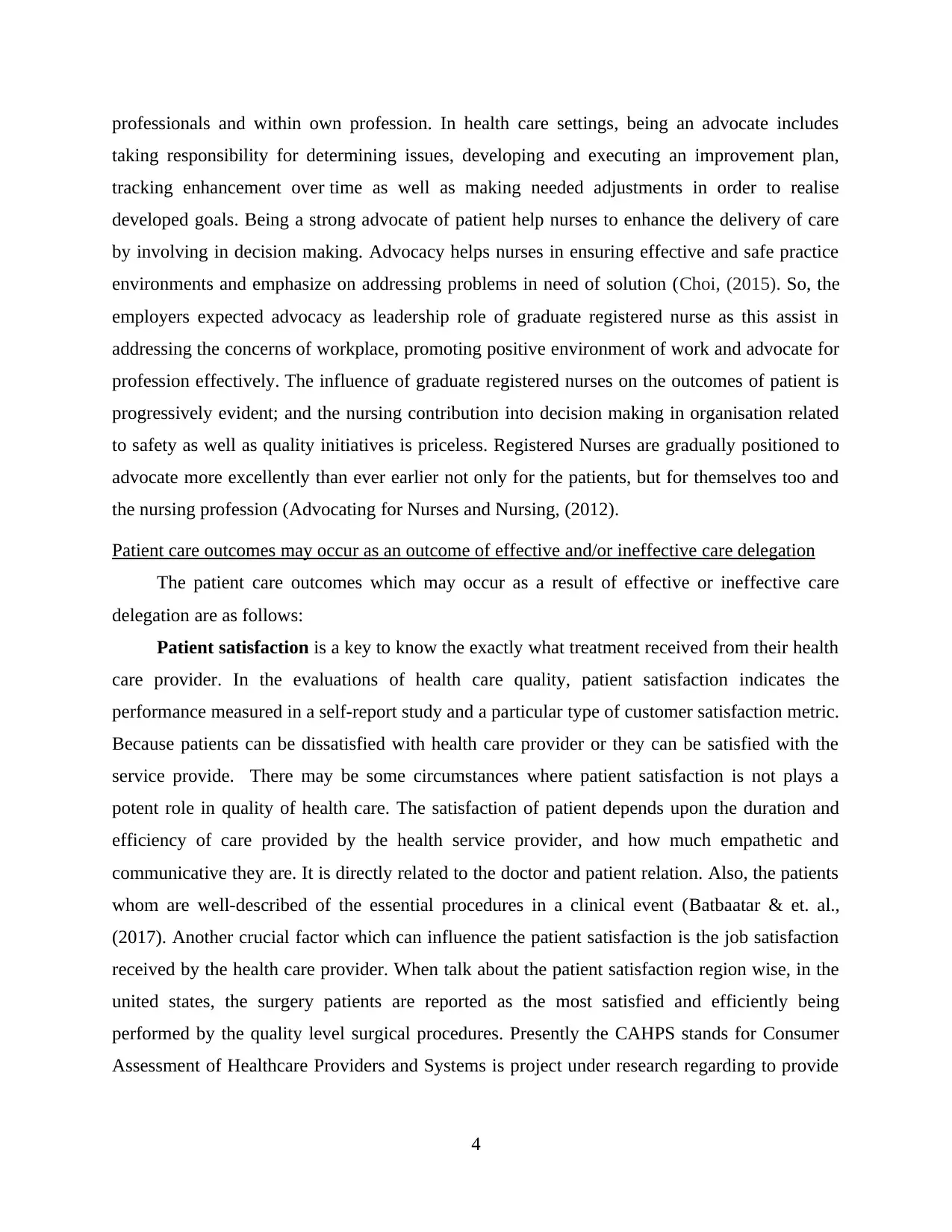
professionals and within own profession. In health care settings, being an advocate includes
taking responsibility for determining issues, developing and executing an improvement plan,
tracking enhancement over time as well as making needed adjustments in order to realise
developed goals. Being a strong advocate of patient help nurses to enhance the delivery of care
by involving in decision making. Advocacy helps nurses in ensuring effective and safe practice
environments and emphasize on addressing problems in need of solution (Choi, (2015). So, the
employers expected advocacy as leadership role of graduate registered nurse as this assist in
addressing the concerns of workplace, promoting positive environment of work and advocate for
profession effectively. The influence of graduate registered nurses on the outcomes of patient is
progressively evident; and the nursing contribution into decision making in organisation related
to safety as well as quality initiatives is priceless. Registered Nurses are gradually positioned to
advocate more excellently than ever earlier not only for the patients, but for themselves too and
the nursing profession (Advocating for Nurses and Nursing, (2012).
Patient care outcomes may occur as an outcome of effective and/or ineffective care delegation
The patient care outcomes which may occur as a result of effective or ineffective care
delegation are as follows:
Patient satisfaction is a key to know the exactly what treatment received from their health
care provider. In the evaluations of health care quality, patient satisfaction indicates the
performance measured in a self-report study and a particular type of customer satisfaction metric.
Because patients can be dissatisfied with health care provider or they can be satisfied with the
service provide. There may be some circumstances where patient satisfaction is not plays a
potent role in quality of health care. The satisfaction of patient depends upon the duration and
efficiency of care provided by the health service provider, and how much empathetic and
communicative they are. It is directly related to the doctor and patient relation. Also, the patients
whom are well-described of the essential procedures in a clinical event (Batbaatar & et. al.,
(2017). Another crucial factor which can influence the patient satisfaction is the job satisfaction
received by the health care provider. When talk about the patient satisfaction region wise, in the
united states, the surgery patients are reported as the most satisfied and efficiently being
performed by the quality level surgical procedures. Presently the CAHPS stands for Consumer
Assessment of Healthcare Providers and Systems is project under research regarding to provide
4
taking responsibility for determining issues, developing and executing an improvement plan,
tracking enhancement over time as well as making needed adjustments in order to realise
developed goals. Being a strong advocate of patient help nurses to enhance the delivery of care
by involving in decision making. Advocacy helps nurses in ensuring effective and safe practice
environments and emphasize on addressing problems in need of solution (Choi, (2015). So, the
employers expected advocacy as leadership role of graduate registered nurse as this assist in
addressing the concerns of workplace, promoting positive environment of work and advocate for
profession effectively. The influence of graduate registered nurses on the outcomes of patient is
progressively evident; and the nursing contribution into decision making in organisation related
to safety as well as quality initiatives is priceless. Registered Nurses are gradually positioned to
advocate more excellently than ever earlier not only for the patients, but for themselves too and
the nursing profession (Advocating for Nurses and Nursing, (2012).
Patient care outcomes may occur as an outcome of effective and/or ineffective care delegation
The patient care outcomes which may occur as a result of effective or ineffective care
delegation are as follows:
Patient satisfaction is a key to know the exactly what treatment received from their health
care provider. In the evaluations of health care quality, patient satisfaction indicates the
performance measured in a self-report study and a particular type of customer satisfaction metric.
Because patients can be dissatisfied with health care provider or they can be satisfied with the
service provide. There may be some circumstances where patient satisfaction is not plays a
potent role in quality of health care. The satisfaction of patient depends upon the duration and
efficiency of care provided by the health service provider, and how much empathetic and
communicative they are. It is directly related to the doctor and patient relation. Also, the patients
whom are well-described of the essential procedures in a clinical event (Batbaatar & et. al.,
(2017). Another crucial factor which can influence the patient satisfaction is the job satisfaction
received by the health care provider. When talk about the patient satisfaction region wise, in the
united states, the surgery patients are reported as the most satisfied and efficiently being
performed by the quality level surgical procedures. Presently the CAHPS stands for Consumer
Assessment of Healthcare Providers and Systems is project under research regarding to provide
4
Paraphrase This Document
Need a fresh take? Get an instant paraphrase of this document with our AI Paraphraser
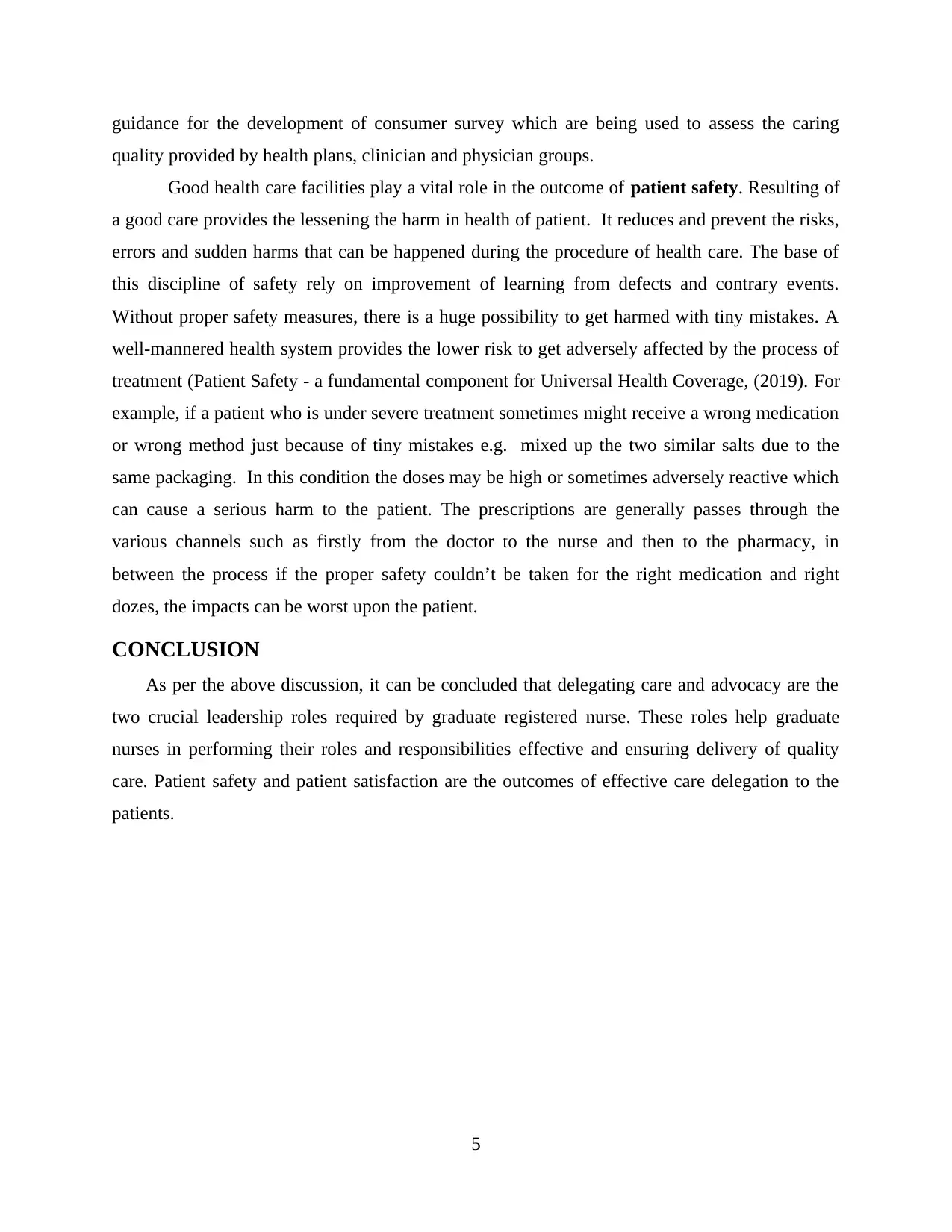
guidance for the development of consumer survey which are being used to assess the caring
quality provided by health plans, clinician and physician groups.
Good health care facilities play a vital role in the outcome of patient safety. Resulting of
a good care provides the lessening the harm in health of patient. It reduces and prevent the risks,
errors and sudden harms that can be happened during the procedure of health care. The base of
this discipline of safety rely on improvement of learning from defects and contrary events.
Without proper safety measures, there is a huge possibility to get harmed with tiny mistakes. A
well-mannered health system provides the lower risk to get adversely affected by the process of
treatment (Patient Safety - a fundamental component for Universal Health Coverage, (2019). For
example, if a patient who is under severe treatment sometimes might receive a wrong medication
or wrong method just because of tiny mistakes e.g. mixed up the two similar salts due to the
same packaging. In this condition the doses may be high or sometimes adversely reactive which
can cause a serious harm to the patient. The prescriptions are generally passes through the
various channels such as firstly from the doctor to the nurse and then to the pharmacy, in
between the process if the proper safety couldn’t be taken for the right medication and right
dozes, the impacts can be worst upon the patient.
CONCLUSION
As per the above discussion, it can be concluded that delegating care and advocacy are the
two crucial leadership roles required by graduate registered nurse. These roles help graduate
nurses in performing their roles and responsibilities effective and ensuring delivery of quality
care. Patient safety and patient satisfaction are the outcomes of effective care delegation to the
patients.
5
quality provided by health plans, clinician and physician groups.
Good health care facilities play a vital role in the outcome of patient safety. Resulting of
a good care provides the lessening the harm in health of patient. It reduces and prevent the risks,
errors and sudden harms that can be happened during the procedure of health care. The base of
this discipline of safety rely on improvement of learning from defects and contrary events.
Without proper safety measures, there is a huge possibility to get harmed with tiny mistakes. A
well-mannered health system provides the lower risk to get adversely affected by the process of
treatment (Patient Safety - a fundamental component for Universal Health Coverage, (2019). For
example, if a patient who is under severe treatment sometimes might receive a wrong medication
or wrong method just because of tiny mistakes e.g. mixed up the two similar salts due to the
same packaging. In this condition the doses may be high or sometimes adversely reactive which
can cause a serious harm to the patient. The prescriptions are generally passes through the
various channels such as firstly from the doctor to the nurse and then to the pharmacy, in
between the process if the proper safety couldn’t be taken for the right medication and right
dozes, the impacts can be worst upon the patient.
CONCLUSION
As per the above discussion, it can be concluded that delegating care and advocacy are the
two crucial leadership roles required by graduate registered nurse. These roles help graduate
nurses in performing their roles and responsibilities effective and ensuring delivery of quality
care. Patient safety and patient satisfaction are the outcomes of effective care delegation to the
patients.
5
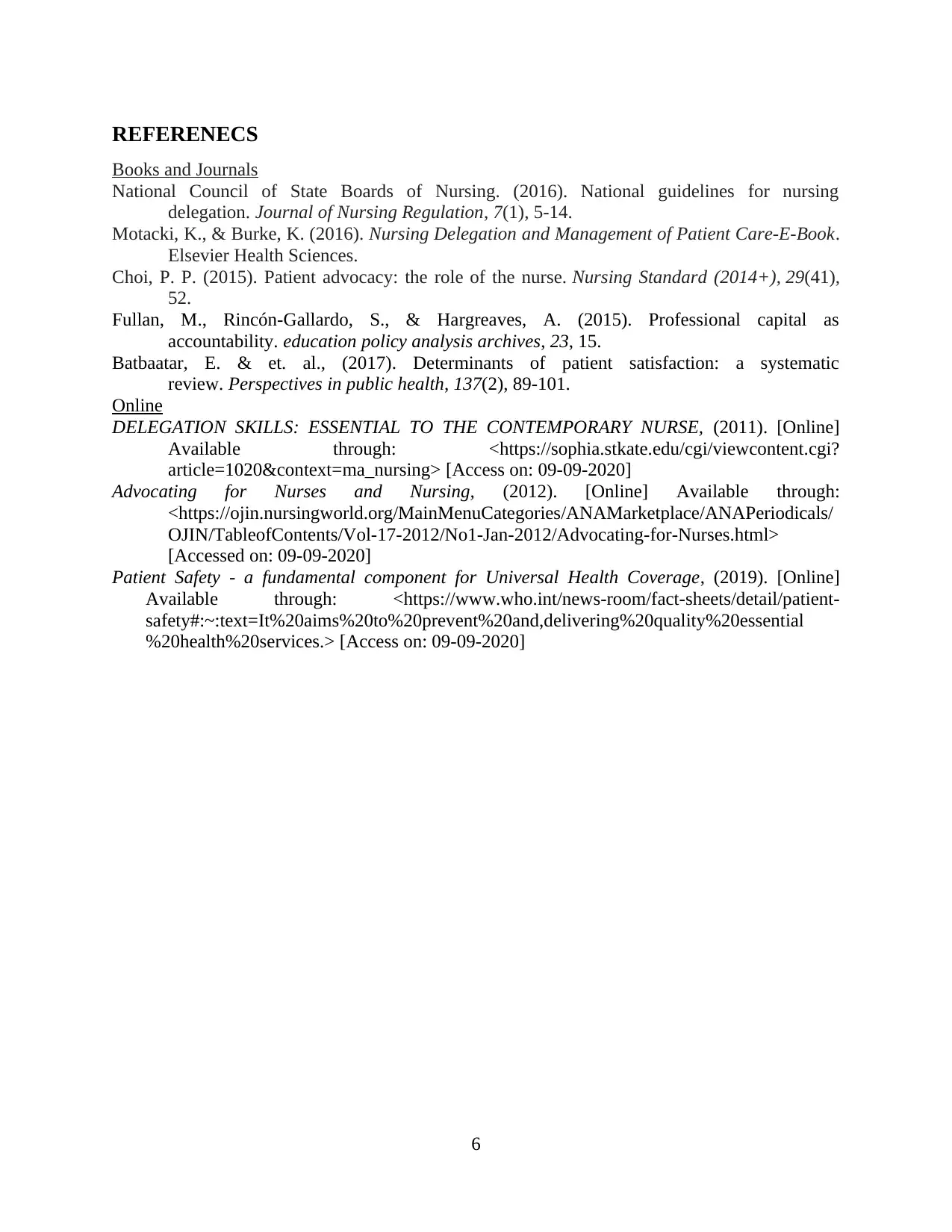
REFERENECS
Books and Journals
National Council of State Boards of Nursing. (2016). National guidelines for nursing
delegation. Journal of Nursing Regulation, 7(1), 5-14.
Motacki, K., & Burke, K. (2016). Nursing Delegation and Management of Patient Care-E-Book.
Elsevier Health Sciences.
Choi, P. P. (2015). Patient advocacy: the role of the nurse. Nursing Standard (2014+), 29(41),
52.
Fullan, M., Rincón-Gallardo, S., & Hargreaves, A. (2015). Professional capital as
accountability. education policy analysis archives, 23, 15.
Batbaatar, E. & et. al., (2017). Determinants of patient satisfaction: a systematic
review. Perspectives in public health, 137(2), 89-101.
Online
DELEGATION SKILLS: ESSENTIAL TO THE CONTEMPORARY NURSE, (2011). [Online]
Available through: <https://sophia.stkate.edu/cgi/viewcontent.cgi?
article=1020&context=ma_nursing> [Access on: 09-09-2020]
Advocating for Nurses and Nursing, (2012). [Online] Available through:
<https://ojin.nursingworld.org/MainMenuCategories/ANAMarketplace/ANAPeriodicals/
OJIN/TableofContents/Vol-17-2012/No1-Jan-2012/Advocating-for-Nurses.html>
[Accessed on: 09-09-2020]
Patient Safety - a fundamental component for Universal Health Coverage, (2019). [Online]
Available through: <https://www.who.int/news-room/fact-sheets/detail/patient-
safety#:~:text=It%20aims%20to%20prevent%20and,delivering%20quality%20essential
%20health%20services.> [Access on: 09-09-2020]
6
Books and Journals
National Council of State Boards of Nursing. (2016). National guidelines for nursing
delegation. Journal of Nursing Regulation, 7(1), 5-14.
Motacki, K., & Burke, K. (2016). Nursing Delegation and Management of Patient Care-E-Book.
Elsevier Health Sciences.
Choi, P. P. (2015). Patient advocacy: the role of the nurse. Nursing Standard (2014+), 29(41),
52.
Fullan, M., Rincón-Gallardo, S., & Hargreaves, A. (2015). Professional capital as
accountability. education policy analysis archives, 23, 15.
Batbaatar, E. & et. al., (2017). Determinants of patient satisfaction: a systematic
review. Perspectives in public health, 137(2), 89-101.
Online
DELEGATION SKILLS: ESSENTIAL TO THE CONTEMPORARY NURSE, (2011). [Online]
Available through: <https://sophia.stkate.edu/cgi/viewcontent.cgi?
article=1020&context=ma_nursing> [Access on: 09-09-2020]
Advocating for Nurses and Nursing, (2012). [Online] Available through:
<https://ojin.nursingworld.org/MainMenuCategories/ANAMarketplace/ANAPeriodicals/
OJIN/TableofContents/Vol-17-2012/No1-Jan-2012/Advocating-for-Nurses.html>
[Accessed on: 09-09-2020]
Patient Safety - a fundamental component for Universal Health Coverage, (2019). [Online]
Available through: <https://www.who.int/news-room/fact-sheets/detail/patient-
safety#:~:text=It%20aims%20to%20prevent%20and,delivering%20quality%20essential
%20health%20services.> [Access on: 09-09-2020]
6
⊘ This is a preview!⊘
Do you want full access?
Subscribe today to unlock all pages.

Trusted by 1+ million students worldwide
1 out of 6
Related Documents
Your All-in-One AI-Powered Toolkit for Academic Success.
+13062052269
info@desklib.com
Available 24*7 on WhatsApp / Email
![[object Object]](/_next/static/media/star-bottom.7253800d.svg)
Unlock your academic potential
Copyright © 2020–2026 A2Z Services. All Rights Reserved. Developed and managed by ZUCOL.





